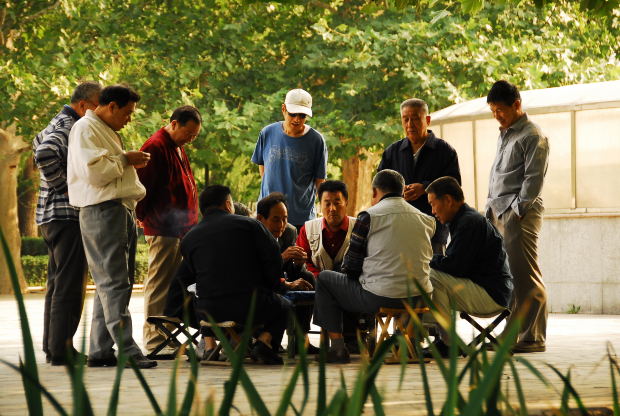
August 23, 2013, by Tony Hong
China’s Elderly – The Old, The Wise and The Burden
By Liam Flaine,
Studying Finance, Accounting and Management at the University of Nottingham UK.
China’s booming commerce industries have caused economic growth levels to soar. In every aspect, China remains a growing superpower. Nevertheless, despite its thriving economical development, ironically it is China’s most durable, legitimate citizens that are inevitably going to restrict further development – the aging population.
Despite many of China’s elderly upholding enormous inner strength battling against decades of disease, famine and poverty, to society they could be potentially viewed as metaphorically putting ‘a foot on the break’, in China’s development. ‘According to the Sixth National Population Census, China’s total population hit 1.339 billion in 2011, with 13.26% being elderly over the age of 60.’ A huge strain in resources will inevitably have to be endured by the elderly citizens’ older children to pay for their parents’ welfare and specialized care, as ‘China has not yet built a social safety net to provide pensions, affordable healthcare or homes for all its elderly.’ Delving into China’s socio-economic laws regarding the 4-2-1 family ratios, families are consisting of four grand-parents, two parents and one child. As a result, not only will parents have to pay for their children’s education, they will also have to convert all their expenditure towards caring for their parents and parent-in-laws. Not only will it reduce their potential quality of life, in economical terms this will transcend into a downwards spiral, with families having less income, causing the average consumer expenditure to decrease, technically causing families across China to become poorer as their expenditure is restricted, possibly effecting China’s internal businesses and overseas trading as less purchases will be made and therefore slowing their overall economic growth.
Putting this theory into a first-hand perspective, whilst researching online I discovered the case of ‘Mr. Zhang – an only child – who stated he felt great economic pressure from his parents and parents-in-law and that he could only ensure a life where the basic needs were satisfied for them.’ When comparing such circumstances to that of the West, it is only then we realize how in the long-term, China’s strict One Child Policy evokes a hidden weakness. With families in the West being able to conceive as many children as they want, this allows a much more equally weighted burden in relation to being financially able to provide care for their parents during their adult life. Nonetheless, the West has an excessively strong network of health and care facilities, for example the National Health Service for England, which provides elderly citizens with a vast range of available nursing homes as well as financially supporting them through secure state pensions.
The long-term effect of an aging population on China’s resources is yet to be uncovered, only the test of time will tell. It has been estimated that the ‘number of elderly over the age of 60 will reach 460 million by 2051, twice that of the young population. It is also estimated that currently there are six workers paying taxes for each retiree – in 20 years’ time, there will be just two workers for every pensioner.’ These figures, coupled with China’s increasing life expectancy (currently 74) promotes the fact that China may need to jump ahead of the treadmill of growth, to fully appreciate the financial threat of caring for their aging population and what it is going to entail and produce a government strategy of available care homes and pensions similar to that of the West, whilst also abiding by their rules and cultural beliefs. If this issue is simply overlooked and remains unaddressed, China may have to embrace the fact that something so seemingly insignificant could in fact be China’s hidden downfall, steadily causing a decline of their marvelled high economic growth.
No comments yet, fill out a comment to be the first

Leave a Reply